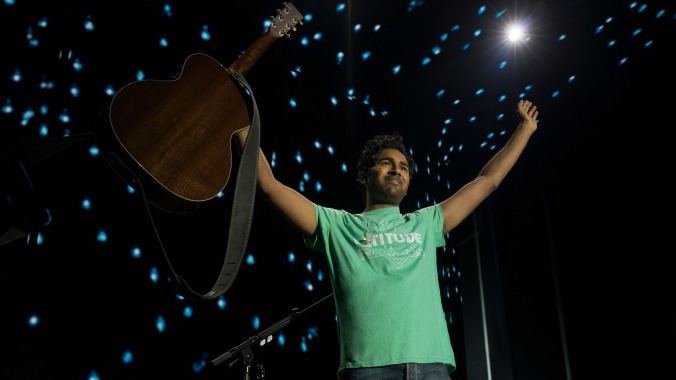Danny Boyle stops short of making a musical out of the Beatles songbook in Yesterday


Though his flashy style and use of pop music suggests otherwise, Danny Boyle didn’t come into filmmaking through directing music videos. Maybe that’s why he’s so unusually smart about integrating music-video technique into his movies. While plenty of former video helmers of the ’80s and ’90s fire up empty spectacle, Boyle understands how to use pop music to make small moments feel huge. The propulsive thump of Iggy Pop’s “Lust For Life” will be forever associated with a gaggle of Scottish junkies running from the cops in Trainspotting; 28 Days Later makes a brief moment of levity more memorable with Grandaddy’s “AM 180”; even a forgotten flop like A Life Less Ordinary boasts a standout song-and-dance sequence. It’s only a matter of time before he makes a full-blown musical.
Yesterday, Boyle’s new Beatles-centric dramedy, comes closer than he’s ever dared before—which makes this likable, hummable movie particularly disappointing when it fails to ignite the pop fireworks of his best work. Perhaps because its animating premise is outlandish, Boyle’s foray into sort-of musical territory is relatively grounded, at least at first. Jack (Himesh Patel) is a struggling musician, reaching that point in so many artistic careers where the artist wonders whether it is, in fact, a viable career. Jack’s biggest fan, best friend, manager, and roadie is Ellie (Lily James), a schoolteacher who does her best to book him, say, a slot at a big music festival, only to watch as hardly anyone drops by the tent to hear his songs.
Just about ready to pack in his guitar for good, Jack gets an unexpected break in the form of a brief, unexplained worldwide blackout. The power goes out, and Jack, riding his bike, is hit by a bus; he wakes up in the hospital with a couple of teeth missing. It takes him a little while to realize that the rest of the world has emerged changed, too: When he plays a few bars of “Yesterday” on a new guitar Ellie has gifted him, none of his friends recognize it, because The Beatles as music fans know them no longer exist.
It’s the kind of fanciful concept that’s custom-made to inspire angry questions from internet nitpickers: How can certain other strains of pop music (like Coldplay’s “Fix You,” name-checked by one character, or Ed Sheeran, who has a full-on supporting role as himself) exist in an alternate Beatles-free world? How altered are the memories of millions of people who logged meaningful experiences with the band? And why are some viewers too literal-minded to accept a fairly simple Twilight Zone-style what-if premise?
The screenplay, from professional sap-tapper and shlock-appreciator Richard Curtis, does not answer any of those questions, exactly, though it makes a reliable running gag out of Jack finding out what else has changed in this post-blackout world. (It’s engineered for laughs, not logic, so it may only irritate the nitpickers further.) The movie focuses more on the opportunity that has dropped into Jack’s specific lap. As a longtime singer-songwriter, he can reconstruct many Beatles classics from memory—and, with the collective consciousness altered, he passes off “Yesterday,” “Let It Be,” “Hey Jude,” and all the rest as his own compositions, give or take a few modifications. (Sheeran himself suggests flipping “Jude” to “Dude,” and if the real-life superstar’s appearance in the movie feels like a gimmick, at least he’s game to play a particularly lame version of himself.)
Another question Boyle and Curtis don’t care to address is whether a bunch of Beatles songs would have the same impact dropped, context-free, into 2019. Or rather, they take it as a given that yes, they absolutely would, and Jack’s central dilemma has to do with his impending (and fundamentally dishonest) success. Debra (Kate McKinnon), an American record producer, takes him under her wing and makes plenty of lazy asides about how she views him only as a commodity to be exploited. As Jack puts out singles and prepares to release an all-killer, no-filler debut album (he doesn’t appear to throw in any token non-genius tracks like “Wild Honey Pie”), distance grows between him and Ellie, the kind of movie best friend who exists less for genuine friendship than for romantic pining that only a dope would fail to notice.
Still, it’s easy to root for both Jack and Ellie, because Patel and James are both charmers with sweet singing voices—though only Patel has much chance to show that off, as Yesterday presents most of its music through diegetic performance. It’s probably unfair to ding Boyle for not committing to a proper musical form (basically, for not remaking Julie Taymor’s silly but intermittently brilliant Across The Universe). But it’s also impossible to ignore how when Boyle directs musical sequences that go beyond concert footage, like a montaged marathon of Jack, Ellie, and a local producer recording “I Wanna Hold Your Hand” and other early-period hits, the movie crackles and bops like his best work, an MTV-style musical itching to get out.
For long stretches, though, Yesterday is as middle-of-the-road as anything the director has made. He always shoots brightly and energetically, and it’s fun to see a requisite Hard Day’s Night homage from the guy who made it an oblique reference point in a movie about heroin addicts. That’s about as far as it goes, though; the typical Boyle push into third-act paranoia is only hinted at, and the movie is too mild to take full advantage of his visual gifts. Despite a few lovely touches related to the band’s cultural and personal impact, Curtis and Boyle steadfastly treat the Beatles as a phenomenon, not as artists with their own idiosyncrasies. Jack barely mentions a specific album, never mind a non-single cut that he personally prefers to, say, anything found on the popular 1 compilation.
It’s not invalid to observe the ways great popular art can feel like it belongs to everyone, no matter how it’s disseminated or received. It’s just hard to reconcile this universalist approach with Boyle’s previous films, where the director seemed as dedicated to selecting the right Underworld or Wolf Alice track as any mixtape-making nerd. Indeed, one of the delights of discovering the Beatles at any age is how the most popular rock band ever can still make new fans feel like music nerds. It’s a quality that Yesterday replaces with, essentially, Richard Curtis retyping “All You Need Is Love.” Jack never attempts to impose his own personality on his endless and pleasant covers. Neither does Boyle.